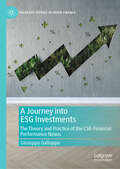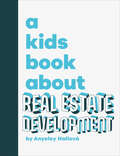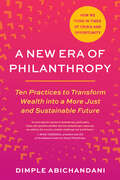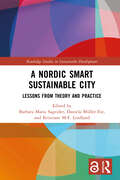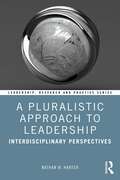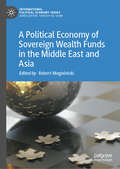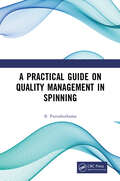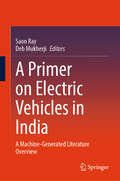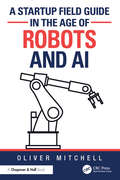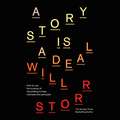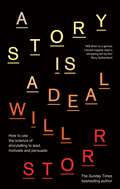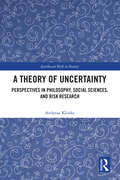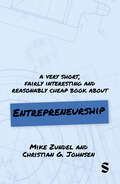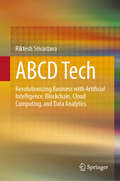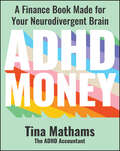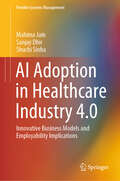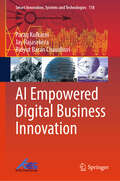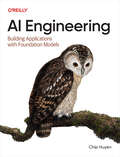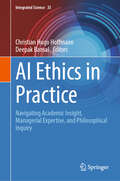- Table View
- List View
A Journey into ESG Investments: The Theory and Practice of the CSR-Financial Performance Nexus (Palgrave Studies in Impact Finance)
by Giuseppe GalloppoThis book deals with climate finance and presents a balance between the theoretical framework—as drawn by the most widely cited practitioner-oriented and academic journals in environmental management—and experimental finance. Does sustainability work eventually? This book explores the data from empirical analysis to address this question. The book investigates the effectiveness of Corporate Social Responsibility and its empirical verification by analyzing the correlation between firm-specific ESG characteristics and financial performance, and will be of interest to academics, researchers, and practitioners of sustainable finance and climate finance.
A Kids Book About Real Estate Development (A Kids Book)
by Anyeley HallovaWhat do you know about real estate development? If your answer is “not a lot", you’re in the right place! Learn about this powerful industry, how it started, and how it can evolve in the future. Anyone can become a real estate developer, and everyone can be involved in how building projects impact their community.
A New Era of Philanthropy: Ten Practices to Transform Wealth into a More Just and Sustainable Future-- How we fund in times of crisis and opportunity
by Dimple Abichandani&“A must-read for anyone in philanthropy, particularly those who question whether and how philanthropic resources can address the current, complex challenges our world faces.&” —Nick Tedesco, president and chief executive officer of the National Center for Family Philanthropy A blueprint for how wealth can be transformed into a more just and sustainable future in times of rapid change and crisis.On the cusp of the greatest wealth transfer in history—with $84 trillion dollars moving between generations in the next 20 years—this book explores how philanthropy can be transformative, and transformed.Can philanthropy be an anti-racist, feminist, relational, and joyful expression of solidarity?This book argues that it not only can be—for the future we seek, and for philanthropy to achieve its greatest impact, it must be.Nationally recognized philanthropic leader Dimple Abichandani revolutionizes the precepts of modern philanthropy. Offering 10 provocative practice shifts, A New Era of Philanthropy engages readers with fresh answers to the question of how philanthropy can meet this high-stakes moment—from reimagining governance to aligning investments to crisis funding and beyond.Abichandani highlights paradigm shifts that model the way forward, moving beyond critique into real transformation, with relatable stories about funders who are forging a new era of philanthropy.A New Era of Philanthropy picks up where key books like Decolonizing Wealth and Winners Take All leave off, offering a guide for donors, foundations, and non-profit leaders navigating philanthropy in urgent times. Clear-eyed, hopeful, and responsive to the moment, this book helps us reimagine the purpose and norms of modern philanthropy. It is an invitation to all of us who believe these resources can contribute to a more just future: start here.
A Nordic Smart Sustainable City: Lessons from Theory and Practice (Routledge Studies in Sustainable Development)
by Barbara Maria SageidetThis book critically explores research and development on the smart sustainable city, emphasizing the tension and association between smartness and sustainability, both as a concept and as a phenomenon in a Nordic context.Worldwide, increasing urbanization and its related challenges, along with urgent environmental issues, have sped up the international interest for smart, sustainable cities as a concept that could increase the efficiency of services, minimize environmental impacts, and improve the quality of living in cities and urban areas. This book scientifically discusses the provenance, substance, and processes of the smart sustainable city, with illustrative examples of how it is translated into urban realities in a medium-sized city, drawing upon Stavanger, one of the first, and one of the leading smart sustainable cities in Europe. The book’s multidisciplinary perspectives and thematic lenses include education and knowledge, arts and culture, safety, climate and sustainability, mobility and transport, economics, democracy, participation, innovation and entrepreneurship, data, and communication. While demonstrating the academic breadth and wide-ranging impact of the smart sustainable city concept, the book promotes and updates the ground for mutual understanding, communication, and collaboration between multiple disciplines and stakeholders involved in developing functional, democratic, and sustainable solutions for the urban present and future.A Nordic Smart Sustainable City: Lessons from Theory and Practice presents an overview of scientific and practical current approaches in a readable format for practitioners and administrators in municipalities and related businesses, for researchers, academics, educators, students, and stakeholders.
A Pluralistic Approach to Leadership: Interdisciplinary Perspectives (Leadership: Research and Practice)
by Nathan W. HarterThis thought-provoking book adopts a pluralistic framework to examine leadership and raises important questions about how leadership studies scholars see and do their work.This book begins with an interdisciplinary discussion of what a pluralistic mindset is – a distinct framework for acknowledging and managing a diversity of opinions while retaining an abiding faith in the merits of rigorous investigation. Nathan W. Harter argues that pluralism is an important consideration for leadership scholars, and threads this throughout a series of chapters that explore such topics as the proper duration of leadership episodes, the benefits of dedifferentiation in leadership, the importance of grievance as a motive, the prevalence of noise in decision-making, and the evolving utility of OODA loops. It concludes with a phenomenological experience in the spirit of Michel Serres that considers the role of leadership amid a welter of multiplicities. Throughout, readers are introduced to a number of scholars whose work is not often cited in leadership literature, including Julia Kristeva, Richard McKeon, Pierre Hadot, Eric Voegelin, and John Boyd.Bringing together important lessons and themes from literature, philosophy, and social science, this book offers a novel approach to leadership studies for advanced students and scholars.
A Political Economy of Sovereign Wealth Funds in the Middle East and Asia (International Political Economy Series)
by Robert MogielnickiThis book on sovereign wealth funds (SWFs) in the Middle East and Asia brings together leading scholars and practitioners focusing on investment trends in two prominent and influential regions of the globe. The resulting political economy mapping of these investment vehicles breaks new ground in elucidating prominent geographic contours of the global SWF sector. The interregional framing likewise reveals the strategic economic significance of SWF-facilitated linkages between the Middle East and Asia. The work probes three cross-cutting themes. The initial chapters explore the dynamics of competition and collaboration amongst Middle Eastern and Asian SWFs. This book then turns to the energy, environmental, and sustainability issues shaping SWF investment behavior. Finally, country-specific chapters examine how and why SWF investments materialize within key markets. These interregional connections enabled by sovereign wealth represent an expanding economic frontier with long-term implications for the Middle East, Asia, and the global economy.
A Practical Guide on Quality Management in Spinning
by B. PurushothamaThis book is a hands-on guide that discusses quality management in spinning. It details the techniques, insights and best practices that weave excellence into every fiber. The subject matter of this book discusses the concepts of product objectives and the impact of product features at customer’s end with examples.Print edition not for sale in South Asia (India, Sri Lanka, Nepal, Bangladesh, Pakistan and Bhutan)
A Practical Guide to Paying off Your Mortgage Early
by Lien Luu Sukanlaya SawangOwning a property is a dream for many people, and borrowing from banks is often essential to achieve this. However, having a mortgage can cause real anxiety because of the latent fear of losing our home if we cannot keep up with mortgage payments. Traditionally, homeowners repay their debt over 25 years, but high house prices have made it necessary to increase the term up to 40 years to make monthly payments affordable. Spreading the debt over a longer period of time not only means that borrowers have to pay more interest, but they are also exposed to other risks such as potential interest rate rises and changes in personal circumstances affecting their mortgage eligibility. These can lead to financial worries, financial stress, and reduced well-being. There are few practical guides available to show borrowers how to manage their mortgage debt more effectively, and how to repay their mortgage quickly so that they are debt-free.This book seeks to empower consumers, young and old, by providing a roadmap to help borrowers achieve financial security through planning for the future, insuring their income, and setting up an emergency fund. It also outlines simple strategies for an early repayment of debt, including paying off the capital, making extra payments, and monitoring their mortgage debt. In doing so, it aims to help readers improve their general well-being, enhance their financial security, reduce their financial worries, and eliminate their ‘mortgage insomnia’.
A Primer on Electric Vehicles in India: A Machine-Generated Literature Overview
by Saon Ray Deb MukherjiThis book presents the result of an innovative challenge, to create a systematic literature overview driven by machine-generated content. Questions and related keywords were prepared for the machine to query, discover, collate and structure by Artificial Intelligence (AI) clustering. The AI-based approach seemed especially suitable to provide an innovative perspective as the topics are indeed both complex, interdisciplinary and multidisciplinary, for example, climate, planetary and evolution sciences. Springer Nature has published much on these topics in its journals over the years, so the challenge was for the machine to identify the most relevant content and present it in a structured way that the reader would find useful. The automatically generated literature summaries in this book are intended as a springboard to further discoverability. They are particularly useful to readers with limited time, looking to learn more about the subject quickly and especially if they are new to the topics. Springer Nature seeks to support anyone who needs a fast and effective start in their content discovery journey, from the undergraduate student exploring interdisciplinary content to Master- or PhD-thesis developing research questions, to the practitioner seeking support materials, this book can serve as an inspiration, to name a few examples. It is important to us as a publisher to make the advances in technology easily accessible to our authors and find new ways of AI-based author services that allow human-machine interaction to generate readable, usable, collated, research content.
A Startup Field Guide in the Age of Robots and AI
by Oliver MitchellLaunching a startup is like climbing a mountain, just maybe more treacherous. I say this as I have spent years as a backpacker and entrepreneur. While hiking through the Alaskan Tundra, I feared brown bears and crevasses. Yet, nothing prepared me for the responsibility of payroll for over 200 families relying on my business plan to feed their children.Unlike traditional software, the mere smell of hardware sensors and robot gearing sends shivers through most investors, with red flags arising from the perceived capital inefficiencies and intense research and development. This is coupled with a high talent requirement before launching even a minimum viable product, as these inventions demand a cross-section of skills: mechanical, electrical, and software engineering. To set out on the trail of uncrewed success, machine inventors and founders require a detailed field guide to meet customer demand and financing objectives.My goal for this book is to help you at a pivotal point in your ideation process and, at the same time, introduce you to a cadre of potential mentors. Through interviews with some of the most respected luminaries in this field, I aim to help fortify your resolve to follow your passions and build a billion-dollar company. The chapters of this book have been organized like a field guide, as if you are setting out on a trip in the wild. Just like it’s essential to satiate yourself before scaling mountains, fast-tracking your innovation into the hands of early adopters is vital for achieving success on Main Street.
A Story is a Deal: How to use the science of storytelling to lead, motivate and persuade
by Will StorrIn this highly anticipated follow-up to the Sunday Times bestseller The Science of Storytelling, acclaimed story guru Will Storr shows you how to engage and influence your audience to create irresistible pitches, build passionate brand loyalty, motivate teams and lead with effectiveness and charisma. Using the latest findings from social psychology, evolutionary psychology, organisational psychology and neuroscience, A Story is a Deal argues that we won't unlock the true power of story if we treat it merely as something we read on a page, see on a screen or hear in a speech. Storr shows how successful stories shape identities, which changes beliefs, drives action and achieves extraordinary results. With examples ranging from Aztec rituals to Apple's legendary advertising successes (and long-forgotten fails), A Story is a Deal lays out a revolutionary new method for creating the most persuasive messaging: by harnessing the power of our storytelling brains.
A Story is a Deal: How to use the science of storytelling to lead, motivate and persuade
by Will StorrIn this highly anticipated follow-up to the Sunday Times bestseller The Science of Storytelling, acclaimed story guru Will Storr shows you how to engage and influence your audience to create irresistible pitches, build passionate brand loyalty, motivate teams and lead with effectiveness and charisma. Using the latest findings from social psychology, evolutionary psychology, organisational psychology and neuroscience, A Story is a Deal argues that we won't unlock the true power of story if we treat it merely as something we read on a page, see on a screen or hear in a speech. Storr shows how successful stories shape identities, which changes beliefs, drives action and achieves extraordinary results. With examples ranging from Aztec rituals to Apple's legendary advertising successes (and long-forgotten fails), A Story is a Deal lays out a revolutionary new method for creating the most persuasive messaging: by harnessing the power of our storytelling brains.
A Story is a Deal: How to use the science of storytelling to lead, motivate and persuade
by Will StorrIn this highly anticipated follow-up to the Sunday Times bestseller The Science of Storytelling, acclaimed story guru Will Storr shows you how to engage and influence your audience to create irresistible pitches, build passionate brand loyalty, motivate teams and lead with effectiveness and charisma. Using the latest findings from social psychology, evolutionary psychology, organisational psychology and neuroscience, A Story is a Deal argues that we won't unlock the true power of story if we treat it merely as something we read on a page, see on a screen or hear in a speech. Storr shows how successful stories shape identities, which changes beliefs, drives action and achieves extraordinary results. With examples ranging from Aztec rituals to Apple's legendary advertising successes (and long-forgotten fails), A Story is a Deal lays out a revolutionary new method for creating the most persuasive messaging: by harnessing the power of our storytelling brains.
A Theory of Uncertainty: Perspectives in Philosophy, Social Sciences, and Risk Research (Earthscan Risk in Society)
by Andreas KlinkeUsing sources from classical to modern that broach the phenomenon of uncertainty and its relation to risk, this book creates a novel approach to the recognized but theoretically often unattended issue of uncertainty.Andreas Klinke develops a new, general theory of uncertainty that provides a taxonomy of categories which are deduced from a critical inventory in philosophy, social and natural sciences, and risk research. Comprising six parts, the philosophical grounding of uncertainty sets the stage for the following philosophical and social scientific accounts and explanation of four distinctive guises of uncertainty that form a taxonomic notion and rationale: ontological, epistemological, linguistic-communicative, and teleological uncertainty. The theoretical-conceptual rumination provides a complex, differentiated view of the anatomy of uncertainty and an understanding that can be used in further theoretical and empirical research, as well as socio-political practice. The latter is delineated in the final part addressing the societal domestication of uncertainty.This book will be of great interest to scholars and students in philosophy, social and natural sciences, risk research, as well as inter- and transdisciplinary science fields.
A Therapist’s Guide to Private Practice: Building a Values-based Business
by Sarah ReesThis book is a comprehensive guide to setting up, running and growing a successful private therapy practice that resonates with your values and professional goals.Guiding you through every detail, from making the initial decision to set up your own private therapy practice to scaling your practice, this guide will support you in overcoming the common challenges you may encounter. It is filled with practical exercises, templates and checklists, including business planning actions at the end of each chapter so you can craft your first business plan. Ensuring you have a solid foundation and can shape a private therapy practice that meets your financial and personal needs while reflecting the passion that led you to your profession.A motivational and inspiring read for therapists, psychotherapists, coaches, and counselors. Get ready to turn your dream into reality and create something profoundly impactful and uniquely yours.
A Very Short, Fairly Interesting and Reasonably Cheap Book About Entrepreneurship (Very Short, Fairly Interesting & Cheap Books)
by Mike Zundel Christian Garmann JohnsenConceived by Chris Grey, the Very Short, Fairly Interesting and Reasonably Cheap series offers and antidote to conventional textbooks. Each book takes a core area of the curriculum and turns it on its head by providing a critical and sophisticated overview of the key issues and debates in an informal, conversational and often humorous way. Mike Zundel and Christian G. Johnsen take inspiration from philosophy and art to consider possibilities and effects of entrepreneurship in a changing world. Reflecting on the themes of creativity, destruction, technology and flow, this book offers a theory-driven and critical take on entrepreneurship in an accessible and engaging style, generating new ways of thinking about what entrepreneurship means today and what it could be in the future. Mike Zundel is a Professor in Organization Studies at the University of Liverpool Management School. Christian Garmann Johnsen is an Associate Professor at Copenhagen Business School.
A Very Short, Fairly Interesting and Reasonably Cheap Book About Entrepreneurship (Very Short, Fairly Interesting & Cheap Books)
by Mike Zundel Christian Garmann JohnsenConceived by Chris Grey, the Very Short, Fairly Interesting and Reasonably Cheap series offers and antidote to conventional textbooks. Each book takes a core area of the curriculum and turns it on its head by providing a critical and sophisticated overview of the key issues and debates in an informal, conversational and often humorous way. Mike Zundel and Christian G. Johnsen take inspiration from philosophy and art to consider possibilities and effects of entrepreneurship in a changing world. Reflecting on the themes of creativity, destruction, technology and flow, this book offers a theory-driven and critical take on entrepreneurship in an accessible and engaging style, generating new ways of thinking about what entrepreneurship means today and what it could be in the future. Mike Zundel is a Professor in Organization Studies at the University of Liverpool Management School. Christian Garmann Johnsen is an Associate Professor at Copenhagen Business School.
A Very Short, Fairly Interesting and Reasonably Cheap Book about Brand Management (Very Short, Fairly Interesting & Cheap Books)
by Michael Beverland Pinar CankurtaranEach book in the ‘Very Short, Fairly Interesting & Reasonably Cheap’ series takes a core area of the curriculum and turns it on its head by providing a critical, sophisticated overview of the key issues and debates in an informal, conversational and often humorous way. This accessible and affordable introduction to brand management provides an overview of the controversies and debates, leading thinkers and enduring challenges in brands and branding, with one eye on historical context and cultural and critical perspectives throughout. Michael Beverland and Pinar Cankurtaran are Professor and Associate Professor of Brand Strategy at University of Sussex Business School.
A Very Short, Fairly Interesting and Reasonably Cheap Book about Brand Management (Very Short, Fairly Interesting & Cheap Books)
by Michael Beverland Pinar CankurtaranEach book in the ‘Very Short, Fairly Interesting & Reasonably Cheap’ series takes a core area of the curriculum and turns it on its head by providing a critical, sophisticated overview of the key issues and debates in an informal, conversational and often humorous way. This accessible and affordable introduction to brand management provides an overview of the controversies and debates, leading thinkers and enduring challenges in brands and branding, with one eye on historical context and cultural and critical perspectives throughout. Michael Beverland and Pinar Cankurtaran are Professor and Associate Professor of Brand Strategy at University of Sussex Business School.
ABCD Tech: Revolutionizing Business with Artificial Intelligence, Blockchain, Cloud Computing, and Data Analytics
by Riktesh SrivastavaThis book offers a thorough exploration of how technologies such as Artificial Intelligence (AI), Blockchain, Cloud Computing, and Data Analytics are impacting businesses. It also presents the real-world applications and scenarios where these technologies are driving significant changes. The content not only covers technical details but also highlights the business considerations and economic effects of integrating these technologies into business operations. Key features of the book include practical examples and business scenarios of how businesses are adopting these technologies. These scenarios and examples provide valued understandings for businesses to integrate these ABCD tech, thereby improving processes, gain competitive advantage, and transform business. Readers will benefit from a broad understanding of how ABCD tech work together to drive business transformation. These perceptions into current trends help readers make informed decisions about adopting these technologies. The book is an essential resource for business leaders, IT professionals, and anyone interested in the future impact of these technologies on business.
ADHD Money: A Finance Book Made for Your Neurodivergent Brain
by Tina MathamsEliminate the overwhelm and stay on track with your money goals If you struggle with the time and energy needed to manage your money, you’re not alone. So much financial advice is geared toward neurotypical brains. From checking your bank account to impulse spending and budgets that just don’t work out … It’s time to find the strategies that will help you manage your money in a way that suits your brain. ADHD Money is an empowering personal finance guide. In this book, you’ll learn how and why those with ADHD (and other neurodivergent conditions) often feel frustrated by finances. You’ll discover tips that work for your interest-based nervous system by using key motivation factors. And you’ll get practical, psychology-based tools and worksheets to help you keep going and achieve your money goals. Full of engaging, step-by-step exercises, this book will help you: identify your money values and refresh your money mindset create an ADHD-friendly spending plan and approach budgeting in a way that works for you try new methods for paying off debts and saving money combine money tasks with strategies like body doubling, gamifying and habit stacking achieve your long-term plans The reality is that money and budgeting isn’t always easy. But with ADHD Money, you’ll discover how to take control, keep the spark alive and follow through on your financial dreams. Author Tina Mathams of @theadhdaccountant shares the hacks that will help you keep going and create your own money success.
AI Adoption in Healthcare Industry 4.0: Innovative Business Models and Employability Implications (Flexible Systems Management)
by Sanjay Dhir Shuchi Sinha Mahima JainThis book focuses on the prominent innovative business models and employability implications of artificial intelligence in the healthcare industry 4.0. To do so, it draws upon a rich base of case studies from robotics, virtual assistants, precision medicine, etc., to highlight the possibilities and implications of AI on health care. The book is useful in a variety of ways to the different stakeholders of healthcare sector. It helps medical professionals to understand the impact of the present technologies being adopted and the potential of AI-based technology. The content is of use for the policy makers as it also highlights the managerial and research implications, challenges, opportunities posed by the adoption of AI in healthcare industry 4.0. The rich case study analysis in the area of adoption of AI in healthcare helps generate insights for the academicians and researchers of this field in terms of the parallels drawn between adoptions of AI in healthcare industry 4.0 across the world. It is also useful for management students to understand the key management perspective when healthcare organizations attempt to devise strategies/policies for adoption of AI-driven technologies and processes implementation.
AI Empowered Digital Business Innovation (Smart Innovation, Systems and Technologies #118)
by Parag Kulkarni Jay Rajasekera Bidyut Baran ChaudhuriDigital business innovation is not simply about using new technologies and upgrading business plans but about upgrading your strategic thinking and embedding AI in the thought process. This book covers digital technologies and the strategic landscape of digital entrepreneurship. It elaborates how AI advances converge to create new learning and business opportunities. It includes digital business innovation technologies, AI strategies for businesses, and learning and collaborative learning strategies. Digital business innovation empowers business or changes the paradigm of business and at times redefines it with intelligent technologies. This in turn helps organizations and businesses create better value for customers and address problems that were not possible to address in the past. Digital business innovation can be approached at three levels to increase contextual participation. It includes focused business innovation, strategic AI innovation, and intelligent implementation. The book contains real-life stories of digital business innovation from companies in countries such as Japan, the USA, India, and Singapore. The authors have contributed and witnessed these technological innovations, and hence bring first-hand experience to help readers participate in this journey. It is the journey to create new success stories through AI research that empowers business transformation.
AI Engineering: Building Applications with Foundation Models
by Chip HuyenRecent breakthroughs in AI have not only increased demand for AI products, they've also lowered the barriers to entry for those who want to build AI products. The model-as-a-service approach has transformed AI from an esoteric discipline into a powerful development tool that anyone can use. Everyone, including those with minimal or no prior AI experience, can now leverage AI models to build applications. In this book, author Chip Huyen discusses AI engineering: the process of building applications with readily available foundation models.The book starts with an overview of AI engineering, explaining how it differs from traditional ML engineering and discussing the new AI stack. The more AI is used, the more opportunities there are for catastrophic failures, and therefore, the more important evaluation becomes. This book discusses different approaches to evaluating open-ended models, including the rapidly growing AI-as-a-judge approach.AI application developers will discover how to navigate the AI landscape, including models, datasets, evaluation benchmarks, and the seemingly infinite number of use cases and application patterns. You'll learn a framework for developing an AI application, starting with simple techniques and progressing toward more sophisticated methods, and discover how to efficiently deploy these applications.Understand what AI engineering is and how it differs from traditional machine learning engineeringLearn the process for developing an AI application, the challenges at each step, and approaches to address themExplore various model adaptation techniques, including prompt engineering, RAG, fine-tuning, agents, and dataset engineering, and understand how and why they workExamine the bottlenecks for latency and cost when serving foundation models and learn how to overcome themChoose the right model, dataset, evaluation benchmarks, and metrics for your needsChip Huyen works to accelerate data analytics on GPUs at Voltron Data. Previously, she was with Snorkel AI and NVIDIA, founded an AI infrastructure startup, and taught Machine Learning Systems Design at Stanford. She's the author of the book Designing Machine Learning Systems, an Amazon bestseller in AI.AI Engineering builds upon and is complementary to Designing Machine Learning Systems (O'Reilly).
AI Ethics in Practice: Navigating Academic Insight, Managerial Expertise, and Philosophical Inquiry (Integrated Science #35)
by Christian Hugo Hoffmann Deepak BansalThis book takes us on an in-depth exploration of the evolving intersection between artificial intelligence and ethical considerations. As AI applications extend far beyond technology giants, a robust ethical debate unfolds, addressing issues of discrimination, democracy, and due process. Tech startups, often lacking corporate governance and legal expertise, become central figures in this narrative, facing unique uncertainties. Grounded in applied ethics, this collaborative work between experts from practice and academia investigates responsible tech entrepreneurship, also helping lay practical foundations for startups. Providing diagnostic tools and frameworks, the book is tailored for academics, researchers, and professionals navigating the ethical dimensions of AI in organizational settings. Going beyond managerial insights, the narrative takes a philosophical turn, contemplating not just the capabilities but the ethical responsibilities of AI. Rooted in effective altruism and conceptual analyses, this book serves as a critical resource for those seeking informed, ethical decision-making in the rapidly evolving technological landscape.
